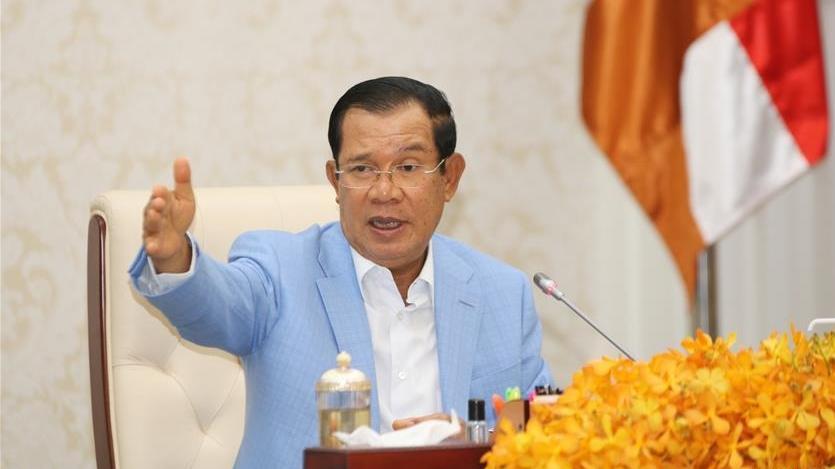 Cambodian Prime Minister Samdech Techo Hun Sen speaks at a new conference in Phnom Penh, Cambodia, on April 7, 2020. (PHOTO / XINHUA)
Cambodian Prime Minister Samdech Techo Hun Sen speaks at a new conference in Phnom Penh, Cambodia, on April 7, 2020. (PHOTO / XINHUA)
Cambodian Prime Minister Hun Sen is visiting Myanmar this week in a trip that is raising eyebrows among some, but experts have expressed hope that he may be able to help bring a resolution to the country’s crisis a step closer.
Hun Sen’s two-day trip, from Jan 7, will make him the first foreign leader to visit Myanmar since Feb 1, 2021. Myanmar’s Foreign Minister Wunna Maung Lwin extended the invitation on behalf of Senior General Min Aung Hlaing, chairman of Myanmar’s State Administration Council, on Dec 7 during a visit he made to the Cambodian capital Phnom Penh.
Hun Sen said on Jan 5 that his trip is to help solve the political crisis in Myanmar based on a five-point consensus reached at the Association of Southeast Asian Nations’ emergency summit on April 24 last year in Jakarta, Indonesia.
The consensus seeks the cessation of all violence and the holding of a constructive dialogue among all the parties to the Myanmar conflict, along with the provision of humanitarian assistance. Additionally, it called for the appointment of an ASEAN special envoy to visit Myanmar and mediate in talks. Cambodia holds the ASEAN rotating chair for 2022.
Kin Phea, director-general of the International Relations Institute at the Royal Academy of Cambodia, said that now is the right time for Hun Sen to head to Myanmar. He said the Cambodian leader’s actions are expected to be consistent with the ASEAN charter and the five-point consensus.
On Jan 4, Hun Sen discussed the Myanmar situation with Indonesian President Joko Widodo by phone.
While reaffirming the support for Cambodia’s ASEAN chairmanship, Widodo said on Twitter on Jan 5 that he “reiterated clearly Indonesia’s position on the importance of the implementation of five-point consensus to bring democracy back in Myanmar through inclusive dialogue”.
Kin Phea, stressing the importance of engagement with all stakeholders, said: “If we do not engage with the military leader, we cannot achieve any solution at all.” He said all stakeholders need to play a role in easing the tensions in Myanmar.
Cambodian Deputy Prime Minister and Foreign Minister Prak Sokhonn said on Jan 3 that Hun Sen’s visit is taking place because of the “deadlock” that arose from the failure to reach an agreement on the implementation of the five-point consensus.
Prak Sokhonn was nominated the new ASEAN special envoy to Myanmar by Hun Sen in December, replacing Erywan Yusof, Brunei’s second minister for foreign affairs, who was appointed in August. Neither of them has yet visited Myanmar.
Prak Sokhonn and a number of senior government officials will also visit Myanmar, according to Cambodia’s foreign ministry.
Hun Sen is scheduled to hold a meeting with Myanmar’s Commander-in-Chief of Defence Services Senior General Min Aung Hlaing, who is also chairman of the State Administration Council of Myanmar, to discuss and exchange views on bilateral and multilateral cooperation and the recent ASEAN developments.
However, Hun Sen’s visit has drawn opposition from civil society organizations in Myanmar and Cambodia. In a joint statement on Jan 4, they said a plan to “act unilaterally in addressing the multidimensional crisis in Myanmar is utterly insufficient”.
Cambodia faces various threats, with recent incidents including an explosion near the Cambodian embassy in Yangon on Dec 31. Still, the foreign minister said it is the duty of the ASEAN chair to play a role and that the country will do what it thinks is best for ASEAN as a whole.
He said the purpose of Hun Sen’s visit is to talk directly to the Myanmar military leader and to see what can be done to restore normalcy to the country.
People in Myanmar face an “unprecedented” crisis, with about 14.4 million people, or a quarter of the country’s population, requiring aid this year, the United Nations Office for the Coordination of Humanitarian Affairs said on Dec 31.
Kavi Chongkittavorn, a senior fellow with the Institute of Security and International Studies in Thailand, said it is highly unlikely that Hun Sen will return empty-handed from Nay Pyi Taw, Myanmar’s capital, though critics may remain skeptical about “any trumpeted achievements”.
Xinhua contributed to this report.


